Signs Your Cat Is Dying And When To Euthanize
There is nothing more challenging than watching your feline friend reach their end.
Our cats can begin to decline in health as they enter their senior years, making it so important for us to know when it’s time to say goodbye.
So what are the signs of a dying cat?
In this article we will get into the details of complications in elderly cats, and help you understand when it may be time to say goodbye to your feline friend.
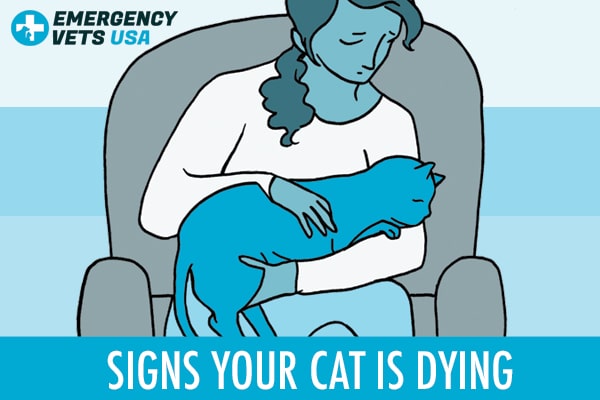
Common Illness In Elderly Cats
As our cats reach their senior years, they may begin to experience illness and overall decline in their health.
While some cats simply deteriorate in health due to old age, others struggle with chronic illness.
To help you understand the possible ailments that your senior cat may experience, let’s discuss some of the most common health conditions in elderly cats.
Old Age
While old age is not an illness in cats, some cats do simply deteriorate due to being around for an extended period of time.
Similar to humans, our cats will begin to slow down and experience daily struggles when they enter a geriatric stage.
Older cats may experience stiffness, slow mobility, slight weight loss, and appetite changes.
Each of these symptoms can be associated with aging in cats, but should always be explored by your veterinarian just in case.
If your cat is experiencing any of the above signs, it might mean that your cat is dying of old age.
Kidney Disease
Kidney disease is extremely common in older cats.
While kidney disease is manageable in cats, it is a progressive disease that will cause your cat to decline in health over time.
If your cat is struggling in their renal failure, you can expect to see a few common signs.
Kidney failure in cats can cause weight loss, vomiting, lack of appetite, foul breath, and lethargy.
If your cat has kidney failure and is beginning to have any of these symptoms, it may be time to talk to your vet about their quality of life.
Cardiac Disease
Cardiac disease is another common condition in elderly cats.
Not only can the cardiac disease impact your cat’s health, but the medication required to manage heart disease can lead to other health conditions as well.
An old cat that is struggling in their disease may experience labored breathing, weakness, panting, and weakness in their hind limbs.
If your cat has heart disease and is beginning to have any of these symptoms, it may be time to talk to your vet about their quality of life.
Cancer
Though there are many forms of this disease, cancer is a common illness in elderly cats.
Cats can experience cancer of all kinds, and can experience a decline in their health based on the type of cancer they are struggling with.
An elderly cat with cancer may experience weight loss, diarrhea, vomiting, lack of appetite, lethargy, disorientation, and vocalization.
If your cat has cancer and is beginning to have any of these symptoms, it’s probably time to talk to your vet about their quality of life.
Liver Failure
Liver failure is another common condition that can threaten an elderly cat’s health.
No matter the cause of your cat’s liver disease, it can result in a serious decline in health.
Cats struggling with liver failure may experience weight loss, loss of appetite, anemia, and weakness.
If your cat has liver failure and is experiencing any of the above symptoms, it’s best to discuss the possibility of saying goodbye with your veterinarian.
The Stages Of A Cat Dying
No matter the cause of your cat’s decline in health, there are a few standard signs of a cat dying to be aware of.
To help you recognize when it’s time to say goodbye to your cat, let’s discuss the possible signs of a cat beginning to let go.
1.) Cat No Longer Eating
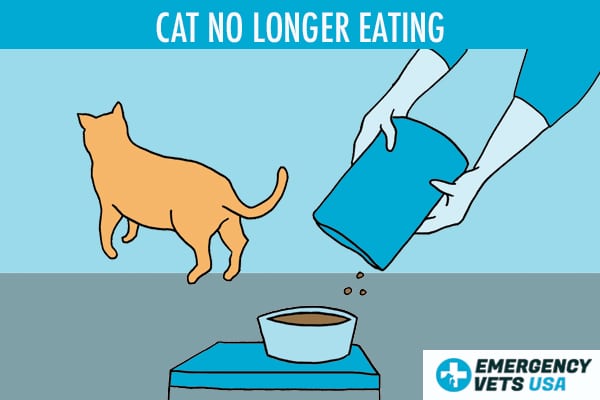
If a cat is nearing their end, they will likely have a decreased appetite.
It may be more challenging to get them to eat their normal meals, or they may not eat at all.
Appetite is such a huge indicator of overall health in cats, that a refusal to eat is one of the most common indicators that it may be time to say goodbye.
2.) Cat Has Extreme Weight Loss
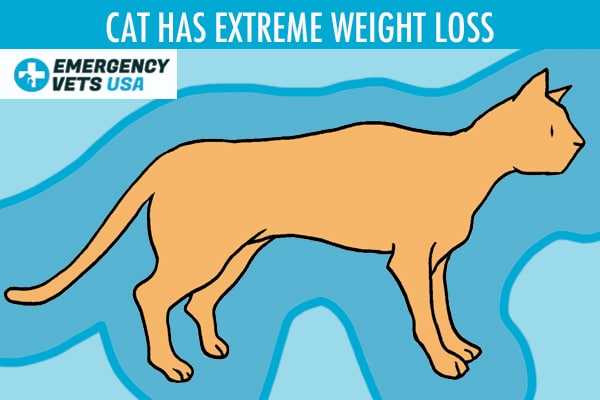
Is your cat so skinny that you can feel their bones when you pet them?
Well, weight loss is another common sign that a cat may be dying.
Many chronic conditions can cause weight loss in their later stages, as well as improper absorption of nutrients.
If your elderly cat is experiencing severe weight loss, it may be time to think about saying goodbye.
3.) Cat Has Lack Of Energy
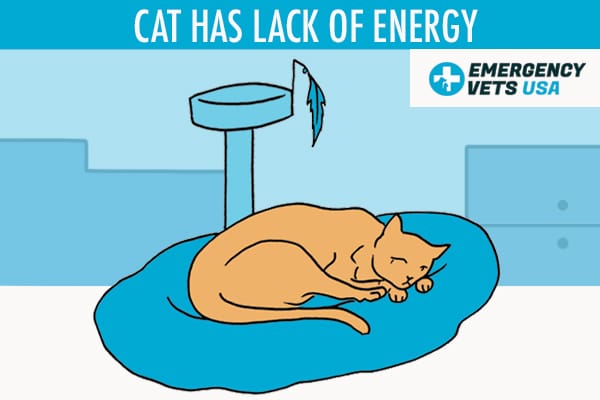
When our cats are nearing the end of their life, they will often experience a lack of energy.
They may not be as willing to do things they once loved, and you may find them sleeping the days away.
If it’s becoming harder and harder to get your cat up and moving each day, you may need to discuss your cat’s quality of life with your veterinarian.
4.) Cat Has Vomiting Or Diarrhea
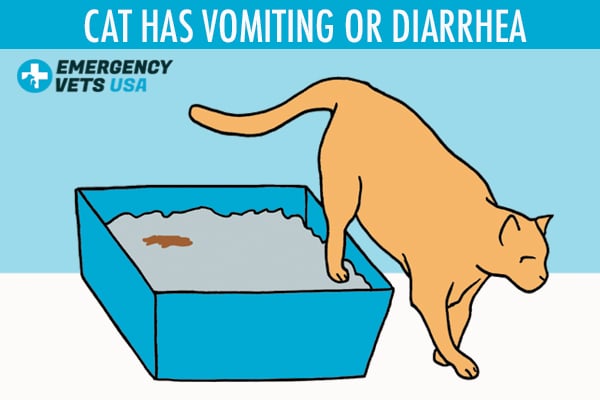
Sometimes a dying cat will experience serious gastrointestinal issues near the end of their life.
Whether it’s due to a chronic medical condition or not, these symptoms can cause a serious drop in their overall health.
If your cat is experiencing chronic vomiting or diarrhea in their old age, it may be time to let them go.
5.) Cat Has Mental Changes
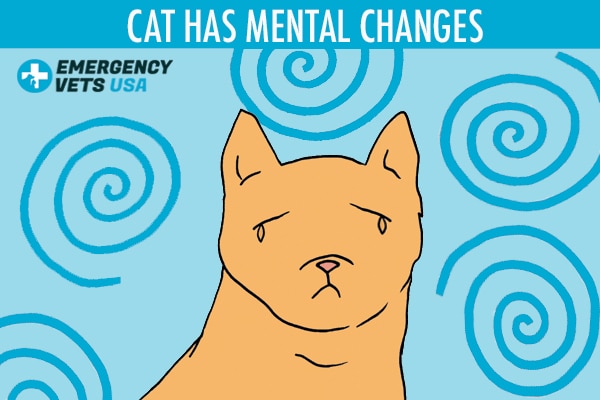
Similar to humans, cats can experience mental changes when they are nearing the end of their life.
Cats can experience dementia-like symptoms in their old age in general, and some medical conditions can make these symptoms even worse.
If your cat is no longer mentally coherent, it might be time to think about saying goodbye.
Extending Your Cat’s Life
While we will have to say goodbye to our cats at some point, there are ways to extend your elderly cat’s life.
Whether your cat has a chronic illness or is just struggling in their old age; there are a few options to discuss with your veterinarian on extending your cat’s life.
Special Diets
If your cat has been diagnosed with a chronic illness, a special diet can help to extend their life in their illness.
Diets tailored to specific diseases are known to support the immune system, limit ingredients that cause complications, and help to manage the condition in general.
If your feline friend is diagnosed with any type of medical condition, be sure to ask your vet about proper diets for their condition.
Hydration
As our cats get older, they may begin to shy away from their water bowl.
Not only is this risky for older cats in general, but dehydration can further aggravate some medical conditions as well.
If you have a senior friend in your life that is struggling with staying hydrated, it’s important to speak to your veterinarian about different options.
Some cats are supplemented for quite some time on subcutaneous fluids at home, while others can simply benefit from a switch to wet food.
To give your cat the best option, we recommend talking to your vet.
Pain Control
Sometimes the best way to offer your senior cat longevity is by controlling their pain as they age.
Some pet parents have to say their final goodbyes due to their cat’s chronic discomfort, so it’s always best to prevent this scenario as best as you can.
For example, some cats become so stiff in their old age that their owners feel like they are beginning to suffer.
By offering supplements or prescribed medication for joint pain, you can make the remainder of their life more enjoyable.
If you think your elderly cat is in pain, it’s best to speak with your vet about your cat’s options.
When To Say Goodbye To Your Dying Cat
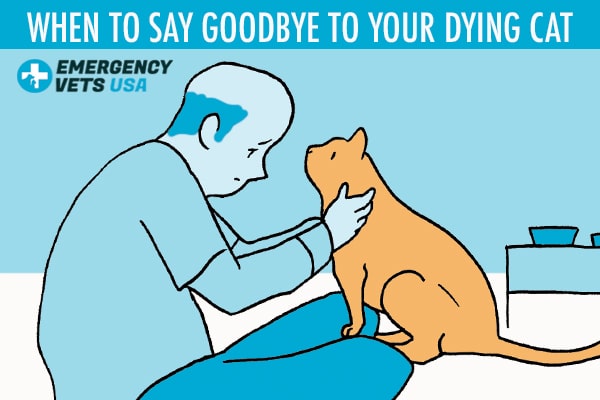
So how do you know when it’s time to say goodbye to your dying cat?
Choosing to let your furry friend go is one of the hardest decisions in pet ownership, especially when you are unaware of the signs to look for.
To help you make the most informed decision for your cat, we will get into the signs of when you know it’s time to say goodbye.
- No longer eating
- Chronic vomiting or diarrhea that won’t resolve
- Extremely weak or always sleeping
- No longer getting up to use the litterbox
- Extreme weight loss
- Dehydration
- No longer responding to supplementary veterinary care
If your cat is experiencing any of the above symptoms, it may be their way of telling you they are ready to let go.
Euthanizing your cat can be the kindest thing you can do for them at this point, as they may only continue to suffer as the time passes.
If you are ever unsure of what is best for your feline friend, your veterinarian can offer the guidance you need.
Saying goodbye to our feline companions is hard, but it can be the purest form of love when they begin to suffer.
Be sure to review the information we discussed above on the signs of a dying cat, and you can better understand your senior cat going forward.

My name is Amber. I am a dedicated animal lover that turned my passion into my career. I am a Licensed Vet Tech with 12 years of experience in veterinary medicine, but I recently took my career online to help spread accurate information on animal care. With how vast the online world is, I have a strong desire to ensure that the reader always walks away with helpful pet advice. With the experience I’ve gained from my time in this field, I have been able to travel the world, offering my services to as many animal rescues as I can find. If I am not at my laptop, or back home visiting family, you can find me somewhere in the world, cuddling every furry friend that I can find! More About Us

I want to thank you for having this site available to u as furry pet owners. Jewels will be 19 years old in August. My issue now is that she has lately not passed stools. She is eating well with the medication that she is on from the vet that I give her every other day; She doesn’t have an appetite otherwise. But, even with her good appetite including her wet food with a teaspoon of pumpkin and Miralax she had twice today, still no stool. She eats her kibble, and drinks from water dishes I have in several places throughout our one-story home, but still no bowel movements. She has taken to her bed for the last 24 hours. She still jumps up next to me when encouraged. Should I get her up out of her bed or just let her be. She doesn’t show signs of pain, etc. I have been told for quite a while that she has CKD. Help! Norma Jean
Hello Amber! I’m so happy & relieved I found this website because of all the comments related to senior cats. My lil boy Sonny just turned 20 on 3MAR22. I’ve been worried because he has started sleeping a lot to the point of putting himself to bed and meowing as if to say: I’m in the room…then I say: OK boy, it’s ok. That’s a new behavior. I’ve wondered how much pain he is in because he gets up and changes positions every 45min or so (just like his mama). Appetite, no accidents but I’ve noticed he is getting anxious and all he wants are treats, almost fixated on them. Of course, I don’t give in…everytime, but then think if he is about to go I would feel bad for not allowing him to live large in his stage of life. He only eats wet food and drinks lots of water. Last month he had a growth on his foot and had surgery under anesthesia to remove it. What a trooper he is but I don’t want him to be in pain. I asked the vet ‘how do I know’ and the response was ‘when he has diarrhea.’ I asked about giving him something for his anxiety and they said ‘because of his age we don’t want to give him anything because it’s not good for his kidneys or liver and to look on-line for something natural. So, I’ve said a lot, maybe it was a little therapy session for me?? Thanks for providing a place with a listening ear and helping us pet parents know what to look for when the time comes and to continue to give our little ones extra, extra lovins & kisses and to thank them for bringing so much joy/happiness to our lives and have the opportunity to really say goodbye. Thank you for all the work you do in behalf of all the fur babies out there, big and small.
My soon to be 14 year old cat has stopped eating. She has a tumor in her intestines. Yesterday she wanted to eat but the amount is hardly anything. Today she won’t eat at all. Is it time to let her go?
Hi Barbara – once a cat stops eating then it really is just a matter of time before they will pass. If she isn’t eating then this is a sign that your cat is dying and eventually just starve to death. You could always give is a couple of days as well as try wet food – cats tend to love wet food. If she still doesn’t eat then maybe you have your answer. So sorry you have to go through this!
I am not the author but I have heard if they go 3 or more days without eating, it might be time to consider it.
Hello Amber, My female cat Mia is 19 years old. She is a Torby. I’m pretty sure she is deaf now and has become quite vocal, especially at night. I keep her in a kennel at night because she pees and poops anywhere. I carry her to her cat box and she does pee almost always. I have had her since she was 1 year old. She has become quite skinny and I can feel her bones everywhere. She sleeps all the time and only gets up to eat or pee when I carry her in the morning. Her respiratory rate seems high. She is slow and lethargic and she cannot jump up on my lap anymore. I have to pick her up all the time. It is very difficult for me to watch all of this happening to her. She is an indoor cat and I refuse to let her go outside. It’s a dangerous world for cats that spend a lot of time outside. To many bad things can happen to them. I think that in itself has lent itself to her longevity. I’m taking her to the vet tomorrow. I think I already know the prognosis. It breaks my heart and takes the wind from my sails. She is my little girl.
Ran, thank you for sharing your story. 18 years with your cat is a very long life! Sounds like you did everything you could to help Mia live the best and longest life possible. Everything you have mentioned makes it see like the only thing to do is euthanasia. That will be the hardest and kindest thing you can do for little Mia.
Hi, I’ve decided to euthanize my 14 year old cat Roshi. He weighs 4 lbs and is always hungry but poops or throws up his food. He cries and paces. I have been giving him pain medication, the vet has prescribed many things to make him better he hasn’t gotten better. He sometimes goes outside his box. He never did before. For me it is very stressful, I have wanted him to pass here at home naturally but I think he is miserable. I have two other senior pets. I’m writing this for support and understanding. Thanks Amber.
My 16 year old kitty is suffering from kidney disease. She has progressively lost weight over the past year and currently at only 4.5 pounds. I noticed that when I am comforting her with ear hugs and neck rubs, if I touch her paws she squirms and pulls them away. I can’t help but wonder if tenderness in the feet could be a sign of circulation problems due to her lack of food and possible dehydration. I know that poor circulation of blood to the feet is one of the stages of that humans experience when death is imminent. Could this be happening to my kitty? She has stopped eating even when I give her a variety of pate foods.
Hi Bernie, sounds like its close to the end for your (well aged) kitty! When they stop eating completely, you need to know that its just a matter of time now. It’s ultimately up to you on how the end comes, naturally or by euthanizing. Keep watch and make sure she isn’t in pain.
Thank you, Amber
She eats both canned and dry food. A little cream if she comes in the kitchen asking. She is a picky eater for sure (nothing new, here) Just hoping she passes on her own, but I have contacted her vet, letting them know we may need an appointment in the near future. Lucy the cat will be eighteen on Saturday.
Amber: I have a 3-legged cat who will be 18 years old the end of September. She has had a slow decline in health…lost a lot of weight (feel her bones), sleeps a lot, seems to have issues with her back end, has recently started to pee and poop around the house. I have not had her to the vet recently because I know that I will be spending a lot of money on testing for them to tell me the inevitable. My question is though…when the time comes that I feel I need to put her down, will a vet do that without wanting to run tests?
Tara, seems like your incredible 3-legged cat lived a long life. When the time come to put your cat down, your vet won’t need to run any tests. Some vets offer in-home euthanasia services, while others will have you bring your cat to them. You can see what options are available to you, within your area. When you go, it’s just a matter of a few moments. As hard as it is, you can stay or leave. Staying will allow you to be with your loved cat while they simply fall asleep.
My cat turns 18 this month. She is skinny, sleeps a lot, slowing down for sure. Lately seems like her hips are giving out when she walks. Still drinks water, eating less and less. Comes to the kitchen if I’m in there, wanting cream. Uses the litter box most of the time. Hard to make the decision, hoping she will pass on her own. Does this happen ever to any animal? I have never owned an animal that passed this way, always needing a decision to be made. Not wanting her to suffer, torn…
Hi Annette, sounds like your cat has live a long life! She is definitely getting up there in age and the progression of getting skinny, sleeping and slowing down are signs of normal aging. You mentioned she is eating less and less. Not sure if you are still on a hard food diet or have already transitioned to softer foods? Your local vet can give you guidance on what you should be feeding her as she gets older.
As mentioned above, look for quality of life and pain. You asked if cats pass naturally and the answer is yes! Most people make the decision to put down their cat because they are usually in pain or their quality of life isn’t there and they don’t want them to suffer. Making that decision will be the hardest one you make, especially with an 18+ year old cat. Been there, done that.. super hard.
Hi Amber, my cat Tiggles is a 12 year old cat and he goes and hides for no reason. I’m also worried because he just wants to be alone so I think my cat may be dying but I cant be sure. If you are wondering why he is called Tiggles, when we got him my dad was messing around and called him Tiggles and it just stuck and if your wondering what breed he is I think he is a black and white shortheard tabby cat ????
Hi Courtney – Sometimes our older feline friends like to be alone, especially the older they get. This does not mean they are dying or are close to dying. There could be other reasons why your cat wants to be alone. Maybe there is a lot of noise, too many people, other animals? As our cats age, they also tend to have more pains that affect them. Being alone or in a calmer environment could be what your Tiggles needs at this age.
Hello Amber
My beautiful senior cat is 15 years old this year. He was a rescue, but has been our boy since the fall of 2007. He is still eating, drinking, using his litter box and likes to spend time in his catio
There are days when he looks so rough—-tired. He vocalizes more on his rough days and may pace somewhat. My concern is if he is wanting to pass away even though physically he is doing fine. I am struggling with making this decision…..my gut feeling is, he is ready to pass, but I am hesitant if I am reading him wrong
Hi Linda – 15 years for a cat is a good long life. Sounds like he still may have some quality of life left in him. If you think he is in pain then making that decision should be easier for you. No one can tell you what you should do for your fur baby, as only you will know when that time will be. Some people will allow their cat to pass naturally, but if they are in pain then euthanasia might be your best option. If it was me, I would look to see if two things were present – quality of life and pain. Sure your cat can have some pain but if it is affecting their life, then I think you know the answer.
Amber: I have 2 cats; one just turned 13 & the other will be 13 next month. My post is in regards to the younger one. A few (2) weeks back she came down w/ a cold or respiratory infection & lost weight due to her stuffed up nose. As I didn’t have the funds for a vet exam, I did the best I could w/ homecare; as strange as that may sound. She got over that but now is very lethargic. Her appetite is back to normal, but I’m still very concerned; to the point of being distraught that she may be dying. I have to wait until my next (monthly) income check to have her examined; they won’t even give advice over the phone. Any advice you can give is greatly appreciated. Thank you.
I’m glad to hear that her appetite has returned. That is one crucial step into the path of recovery. However, I am a bit concerned about the possibilities of complications due to her weight loss and previous anorexia. Cats can develop secondary issues with their liver or kidneys when they have been dehydrated or not taking in enough nutrients. Unfortunately, the only way to rule out those complications is by seeing a vet and performing diagnostics.
However, there are a few ways to offer supplemental care while you wait for your vet appointment. First, I would stay on top of your cat’s eating habits and try to promote weight gain and adequate nutrition. I am not sure what you are feeding your cat, but if she is eating hard kibble, I would also offer her the wet food version of her food as well. If you need any wet food recommendations, Royal Canin has wonderful options. You can also try to heat up her wet food to make it extra smelly, as this will entice a congested cat. Some cat owners also add shredded, boiled chicken to their normal meals to promote weight gain as they recover from an illness.
If she is still congested, you can also consider nebulizing her, or having her in the bathroom while you run a hot shower. This can help to fight off any residual congestion if she is having any.
The last tip involves keeping your cat as hydrated as possible. You can do this by offering her wet food, adding water to her kibble and letting it soak, getting a cat water fountain (as cats seem to enjoy this more), or making sure you have plenty of water bowls around your home.
I wish there was more advice I could offer you online, but things get tricky when it comes to weight loss and lethargy.